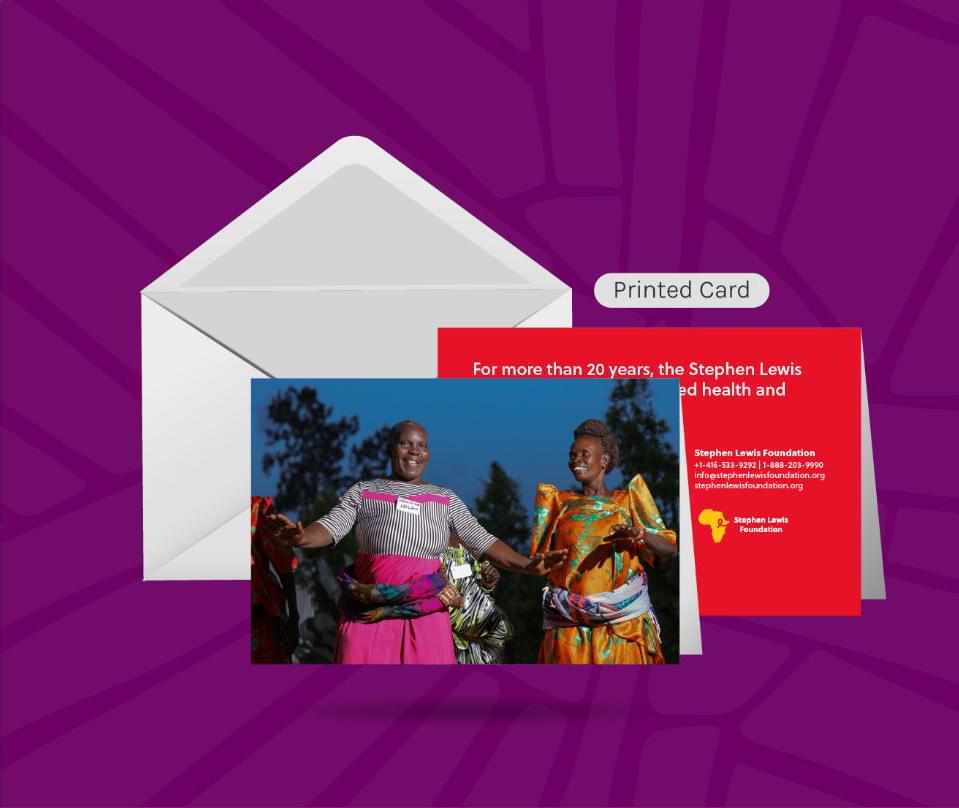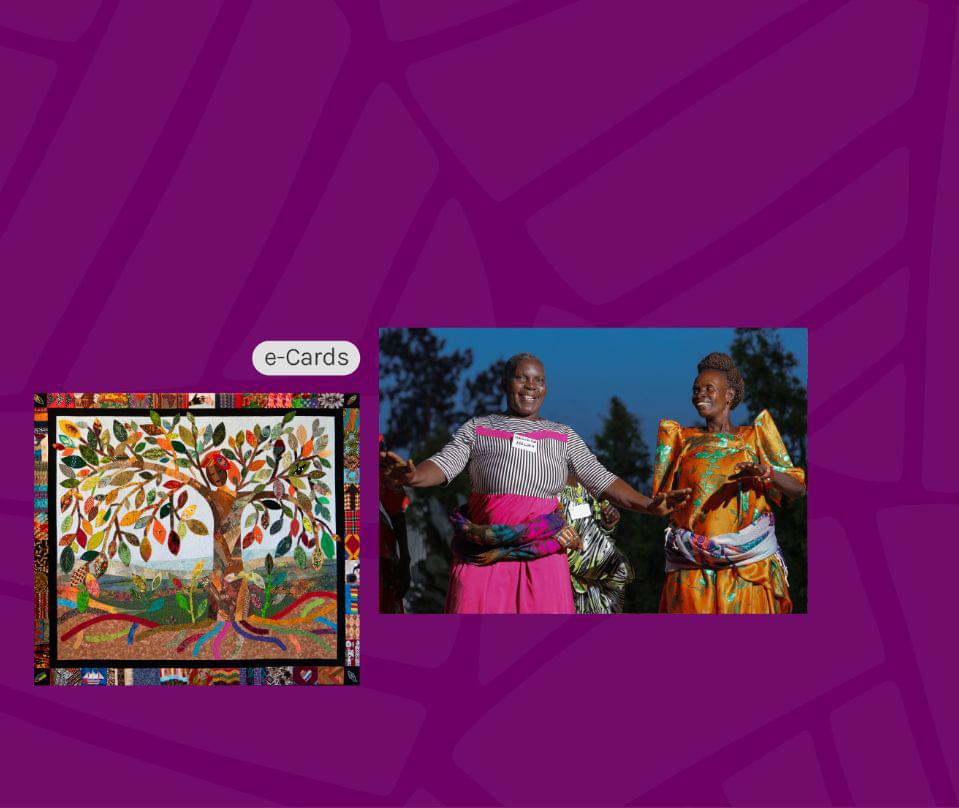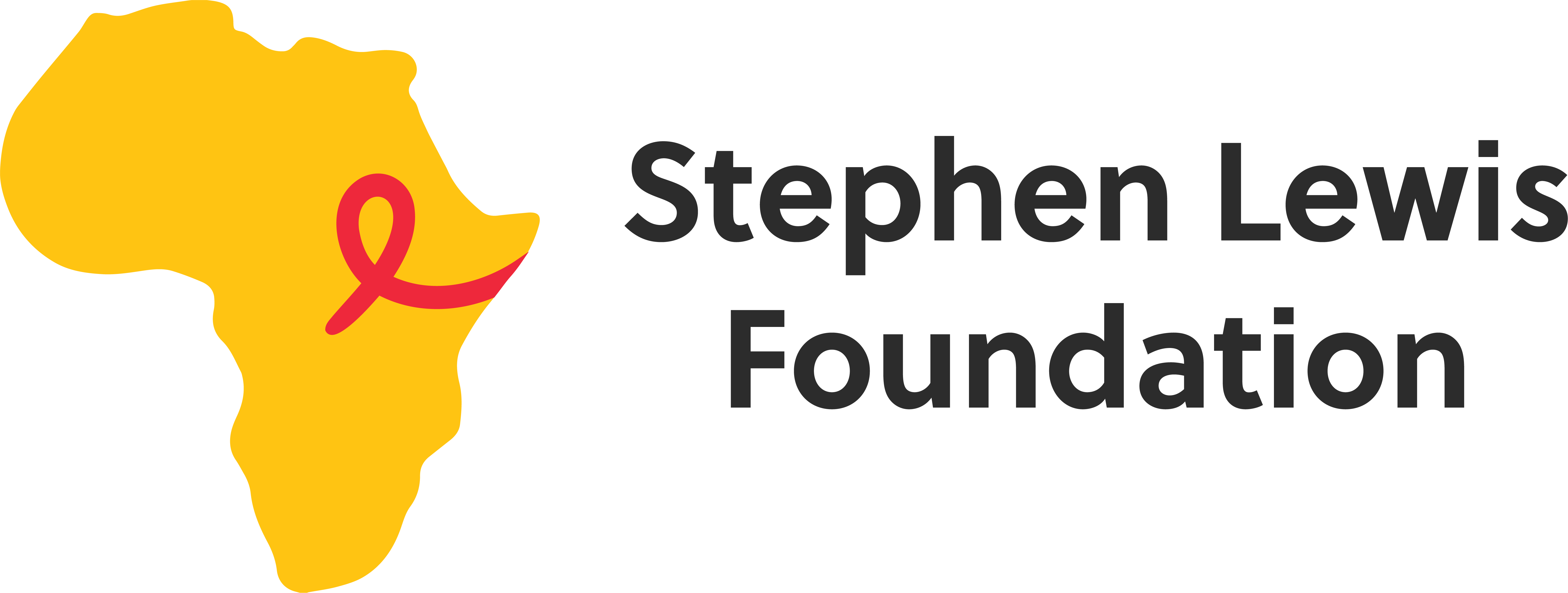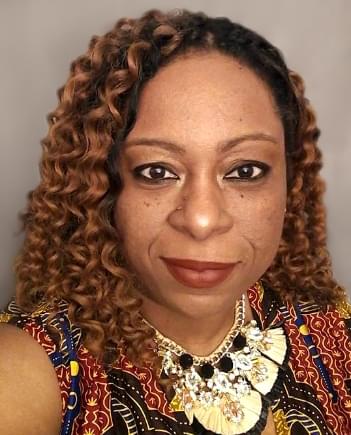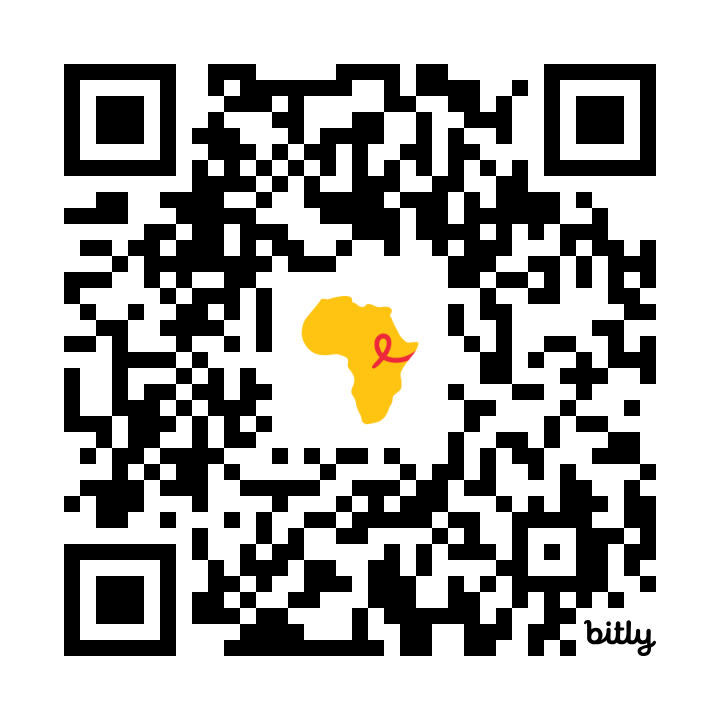Grassroots
FALL 2024
Photo Credit: Eva Gilliam
Organization: FAST
Location: Malawi
Hope in Action
Community-led efforts to end the dual epidemics of gender-based violence and HIV
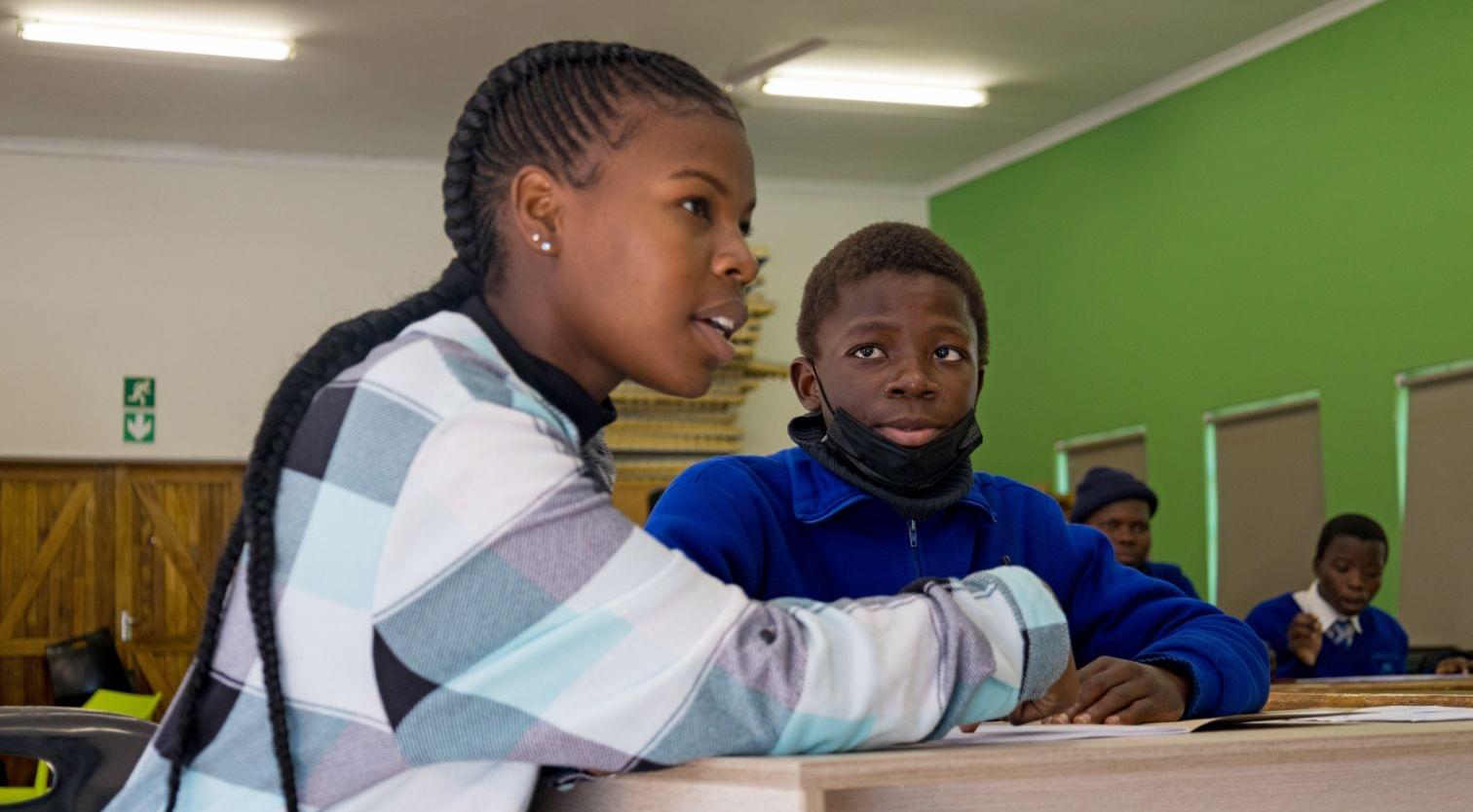
Photo Credit: DeLovie Kwagala
Organization: SSI
Location: Botswana
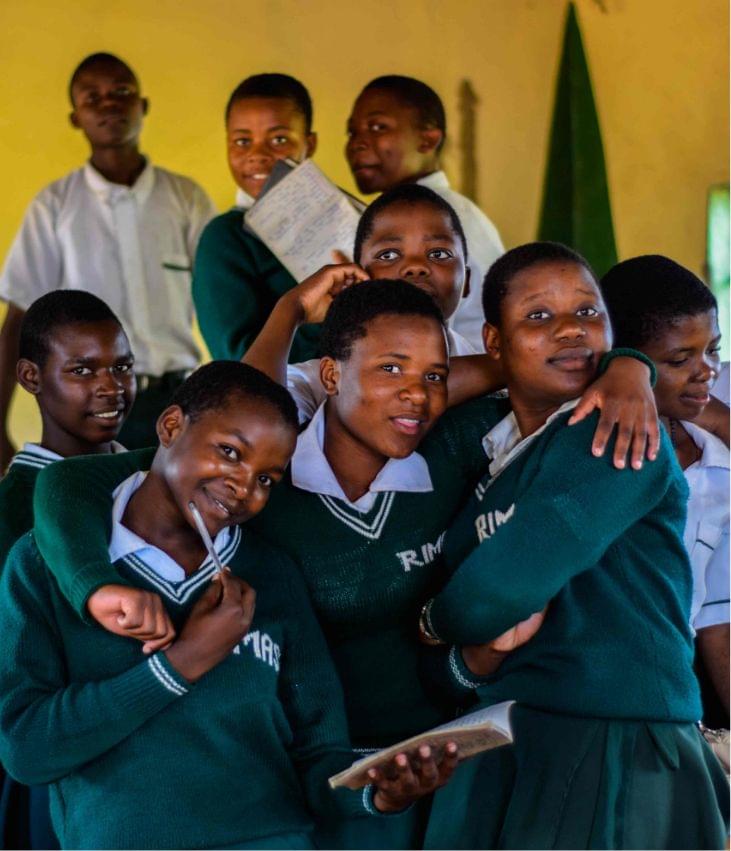
Photo Credit: Blessings Phodogoma, Red Dot Films Malawi
Organization: RISE
Location: Malawi
Millions of women and girls around the world experience physical or sexual violence every year. Gender-based violence, barriers to education and limited income opportunities exponentially increase the risk for women and girls of acquiring HIV. That’s why confronting and dismantling gender inequalities is crucial for preventing and pushing back against the HIV epidemic. To end AIDS, we must address the root causes that create vulnerabilities for people in the first place.
Stepping Stones International (SSI) in Botswana, Rights Institute for Social Empowerment (RISE) in Malawi, and Centre for Widows and Children Assistance (CWCA) in Tanzania are community-led organizations (CLOs) that are making a significant difference for women and girls in their communities.
SSI, RISE and CWCA meet the complex needs of women and girls who have experienced or been affected by gender-based violence with thoughtfully coordinated care. They prioritize building confidence, knowledge and skills to navigate social, health and legal systems.
These partners are also working across generations and with men and boys to equip them with the tools to recognize and report signs of gender-based violence and challenge patriarchal behaviours and beliefs.
Coaching Boys into Men is one of SSI’s violence prevention programs. It combines sports and teamwork along with conversations about girls’ rights and developing relationships built on respect. SSI also mobilizes grandmothers to map hotspots of violence within their community and respond by supporting survivors to report abuse and demand action from local authorities.
Another integral part of the work to end gender-based violence involves convening village leaders and other decision-makers to discuss how traditionally held beliefs about men’s roles in families and society can lead to abuse. These discussions deepen community understanding of the laws that exist to protect women and girls and lead to developing clear processes for reporting violence and seeking justice.
SSI, RISE and CWCA recently premiered short films that document their work to prevent and respond to gender-based violence. They feature survivors, leaders and activists who share about the impact they have seen in their communities. Watch the films on our SLF website at theslf.org/Hope-In-Action.
Despite their powerful and proven impact, CLOs addressing gender-based violence and HIV are drastically underfunded. Continued support and solidarity with these organizations is critical to meaningfully and sustainably addressing the root causes of gender-based violence and creating the conditions for communities to thrive.
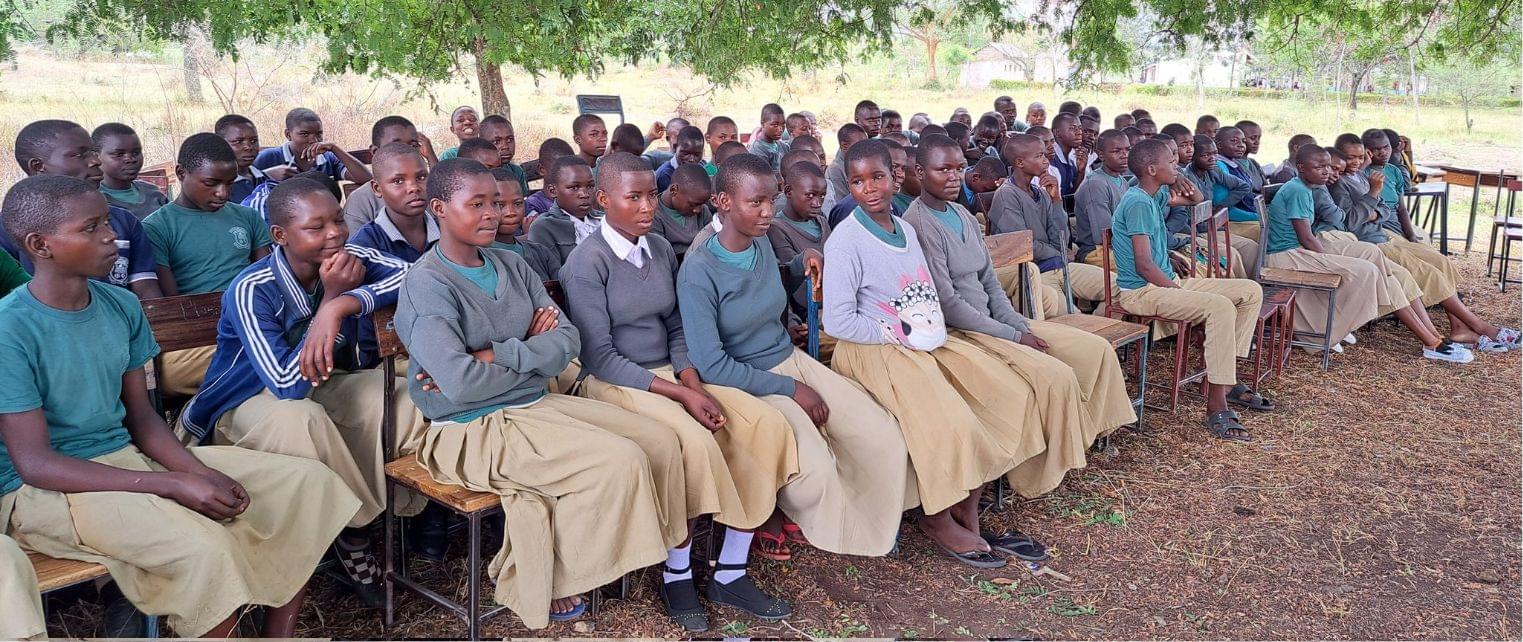
Photo Credit: CWCA
Action for Rural Women’s Empowerment
“All communities should have equitable access to essential needs such as water, food, shelter, education and health services that are environmentally friendly.”
Since 2021, SLF partner Action for Rural Women’s Empowerment (ARUWE) in Uganda has been prioritizing climate change adaptation and resilience in response to increasingly unpredictable cycles of rain and drought threatening communities affected by HIV. In Kyankwanzi District, ARUWE Project Officer Ronald Katwere emphasized how changing weather patterns disrupt ARUWE’s initiatives to increase food production and income generation.
“Prolonged droughts occur every year — especially December to March — leading to hunger and lack of access to water when community wells dry up. Food and water are essential, so this affects drug adherence programs for persons living with HIV…. Erratic rains and heavy winds destroy crops, cause massive soil erosion and damage roads and communication networks, making health centres harder to access.
These changes interrupt the crop calendar, threatening food and income security in our communities. More than 90% of the rural communities of Kyankwanzi earn their livelihoods from agriculture. When harvests fail, communities struggle to meet nutrition and education needs for their children. Households must choose between compromising food security by selling produce to pay school fees, and taking children out of school. The situation is much worse for households led by women and youth, grandmothers, persons living with disabilities and persons living with HIV.”
In response to cascading crises, ARUWE is implementing best practices in communities to support environmental protection and sustainability, including making charcoal with organic alternatives to wood, water and soil management, and using energy-saving stoves and solar panels.
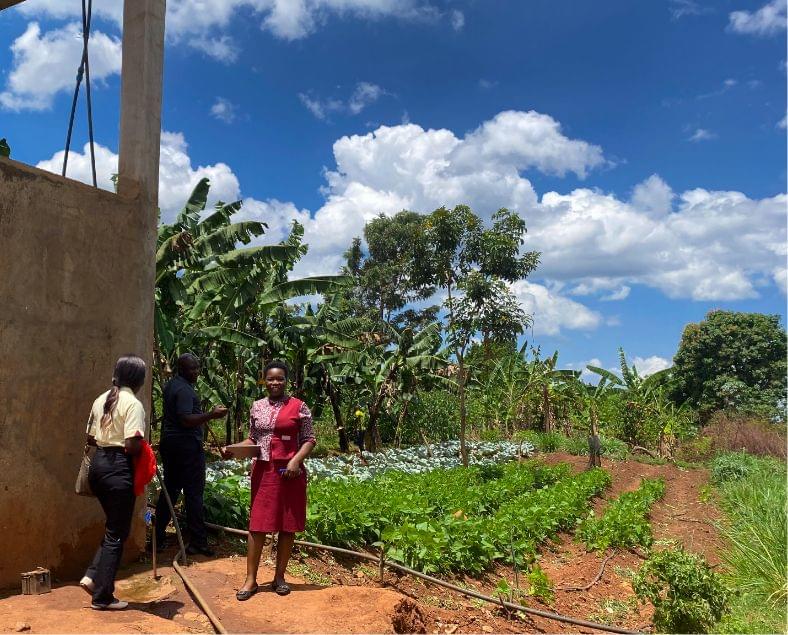
Photo Credit: Jenny Parsley
Organization: ARUWE
Location: Uganda
ARUWE encourages community members to return to traditional methods, including using cow dung for fuel, and to practice organic farming and plant trees. ARUWE’s livelihood programs promote agro-ecology and livestock integration — crops provide feed for the animals and their manure provides nutrients for the crops — to support conservation and regeneration.
“I believe all communities should have equitable access to essential needs such as water, food, shelter, education and health services that are environmentally friendly. And I am optimistic that with collective global efforts this will certainly be achieved,” shares Ronald, hopeful for the future. “I am proud of the initiatives of ARUWE in addressing the global challenges of gender inequality, hunger, poverty, water scarcity, poor health services and access, climate change impacts and poor education services.”
The Stephen Lewis Foundation at AIDS 2024
The conference addressed disparities in the HIV response due to political dedication, resource allocation, racial biases and limited community engagement. Despite challenges, AIDS 2024 instilled in me a sense of optimism in global talent and dedication to combat the HIV epidemic. Community-led initiatives are seen as crucial once resources are decentralized and governments show strong commitment.
— Ndinini Kimesera Sikar, Executive Director and Co-Founder of MWEDO, Tanzania
The 25th International AIDS Conference in Munich provided a vital platform for the Stephen Lewis Foundation (SLF) and our partners to advocate for increased funding to community-led organizations in a way that respects their expertise and does not impose restrictive guidelines.
We held workshops and networking sessions led by staff from SLF partner organizations. They were open and direct about how funder-imposed requirements can undermine their work and limit their ability to effectively address community needs. They also shared how they build on networks of care and trust and have significant impact on health and income security in their communities.
At our workshop, Decolonizing HIV Funding, co-hosted with Funders Concerned About AIDS (FCAA), activists, community leaders and funders were meaningfully engaged. Breakout sessions were organized by funder and organization type — ranging from government and multilateral funders to community-led organizations. Discussions challenged participants to propose concrete solutions and move from theory to practice in funding at the community level without imposing undue funder influence.
The session ended with those in attendance sharing initial actions they plan to take and committing to advance discussions within their organizations.
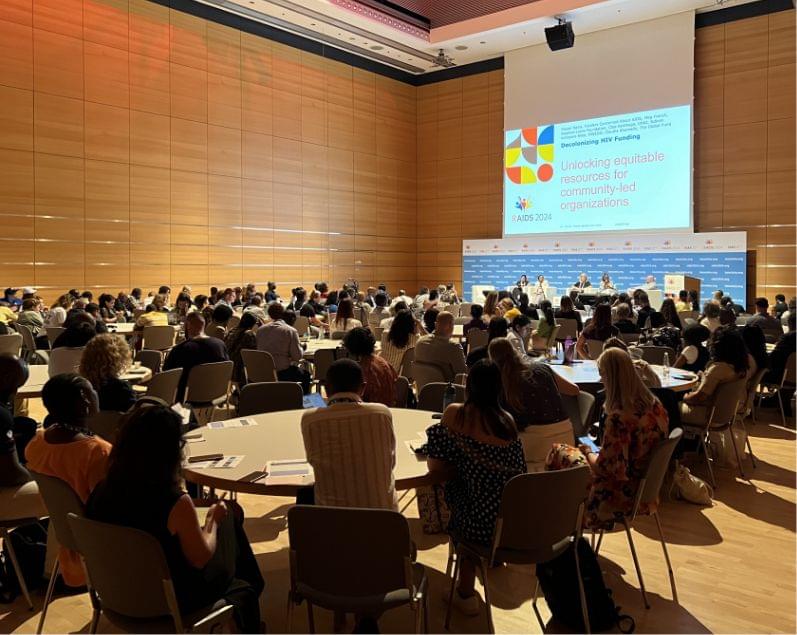
Photo Credit: SLF
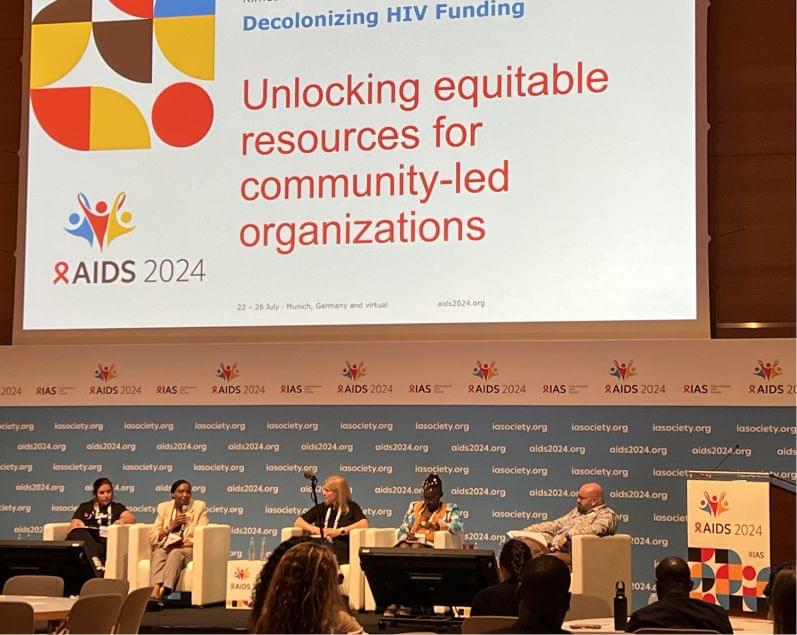
Photo Credit: SLF
At our session The Right to Health and Healing, an overflow audience heard from Sexual Minorities Uganda (SMUG), HAPA-Kenya, Icebreakers Uganda (IBU) and Health Options for Young Men on HIV, AIDS & STIs (HOYMAS) about the need for inclusive mental health and well-being services for LGBTIQ communities, activists and organizational staff in the HIV response.
Leaders and LGBTIQ rights defenders, Allan, Idris, Brant and Trevor, shared about the impact their organizations have had by training peer educators to deliver mental health services, supporting activists to avoid burnout, and sensitizing mainstream health care workers to provide inclusive, stigma-free mental health services.
“I shared how we have been living in a hostile environment working with LGBTIQ organizations but are still creating an impact despite the storms,” says Idris, a program manager at HAPA-Kenya. “I hope the ripple effect [of advocacy at AIDS 2024] is an expectation for more inclusive health service access among marginalized populations. This will help in reducing new [HIV] transmissions and suffering among my community.”
The Right to Health and Healing session allowed leaders of SLF partners who were in attendance to share their own approaches to supporting key populations experiencing persecution. Head of Programs at Mamboleo Peer Empowerment Group (MPEG), Paul, says, “From the audience I was able to share the best practices that we use to ensure men who have sex with men (MSM) are reached with all HIV services amid insecurity. Last year, many MSM feared attacks and were not accessing HIV services at our clinics. We had to be more innovative to reach them. With online [services], tele-medicine and tele-counselling, we have reduced new HIV cases as compared to 2022.”
The SLF remains committed to advancing critical conversations year-round to drive meaningful change in the global HIV response, and to ensure communities’ voices are included and amplified.
Reflecting on her experience at AIDS 2024 Executive Director and Co-Founder of MWEDO, Ndinini Kimesera Sikar says, “The conference addressed disparities in the HIV response due to political dedication, resource allocation, racial biases and limited community engagement. Despite challenges, AIDS 2024 instilled in me a sense of optimism in global talent and dedication to combat the HIV epidemic. Community-led initiatives are seen as crucial once resources are decentralized and governments show strong commitment.”
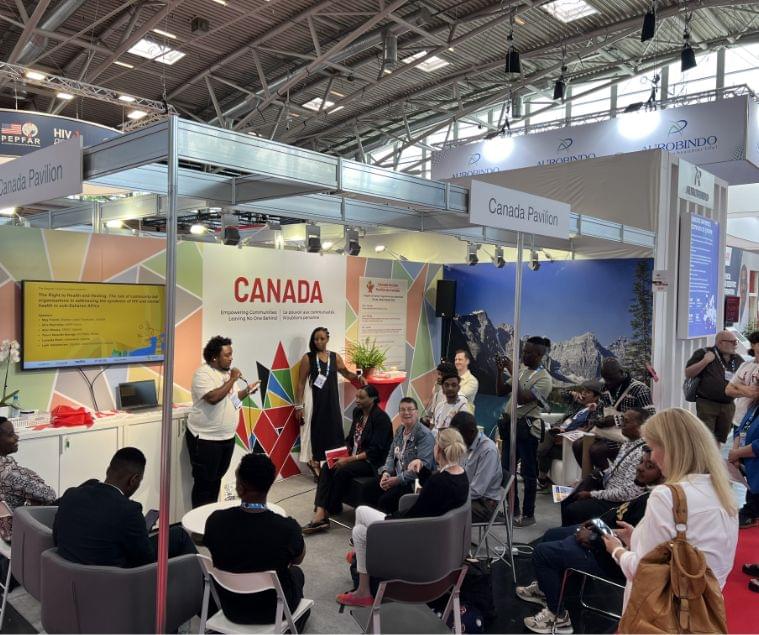
Photo Credit: SLF
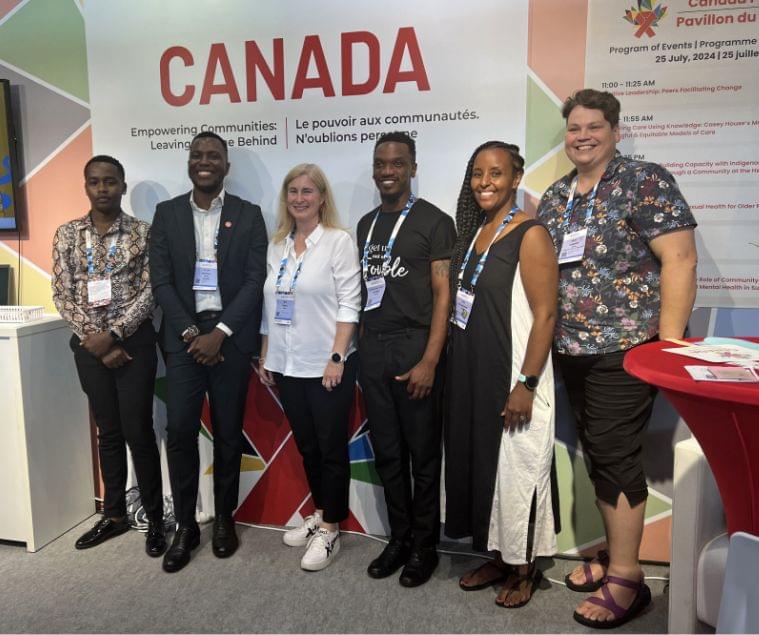
Photo Credit: SLF
The Stephen Lewis Foundation receives the 2024 Lions Humanitarian Award
We’re thrilled to announce that the Stephen Lewis Foundation (SLF) received the 2024 Lions Humanitarian Award, shining a well-deserved spotlight on our community-led partners who are driving transformative change in their communities.
SLF Co-Founder Ilana Landsberg-Lewis accepted the award at the Lions International Convention in Melbourne, Australia, in June. The audience responded enthusiastically to stories of grandmothers’ leadership and the vital role they play in their communities.
Thank you to Lions International for recognizing the power of community-led efforts, and to the SLF community for your solidarity and raising awareness about the SLF. Lions International President Dr. Patti Hill said, “We are truly honoured to present this award to the Stephen Lewis Foundation, whose leaders, donors and volunteers strive to create a future free from stigma and poverty arising from the impact of HIV and AIDS on families in sub-Saharan Africa and to instill hope in generations to come.”
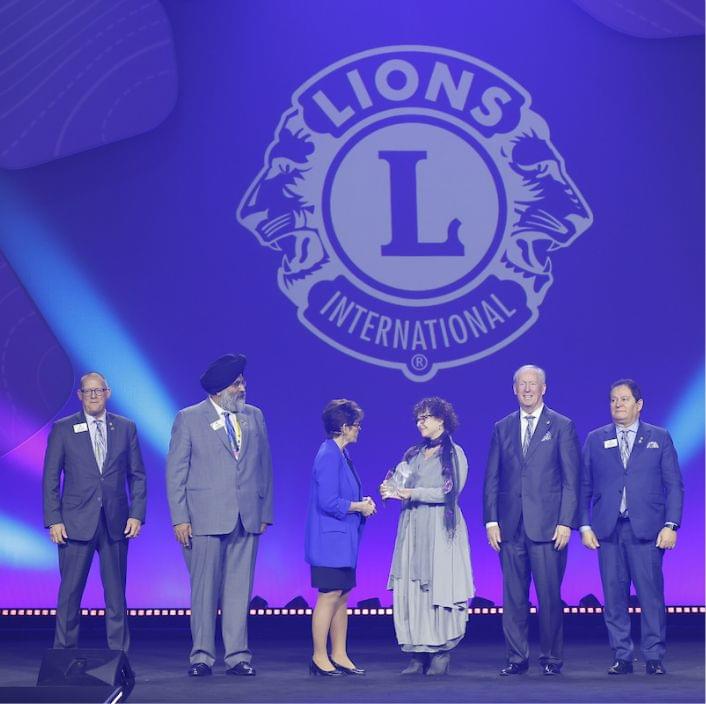
Photo Credit: Lions Club
Monthly donations provide a stable source of funding to build the movement toward a future free from AIDS.
Your recurring gift ensures the Stephen Lewis Foundation (SLF) can maximize our impact in supporting grassroots partners across sub-Saharan Africa. Monthly donations lower administrative costs and enable community-led organizations to sustainably plan for the future.
We commit to using your monthly gift wisely. Here’s what you should know about the SLF:
- We’re a trusted partner who gets funding directly into the hands of community-led organizations at the forefront of the work to end AIDS.
- Thanks to your support, we have 20 years’ experience in providing flexible, reliable and sustained funding. For 44% of our partners, SLF is their only, or primary source of funds.
- Our partnerships are based in solidarity, not charity. We take the lead from our partners who have the established networks of trust and lived experience needed to best support their communities.
- We are accredited by Imagine Canada for our strong financial and governance practices.
Lifting Each Other Higher: Global solidarity in the fight for 2SLGBTIQ+ freedom
A message from Colin Druhan, Executive Director of Pride at Work Canada and Stephen Lewis Foundation Board Member.
When Pride at Work Canada spoke to dozens of queer and trans people in senior management for our 2023 report, Lead with Pride, we discovered something remarkable. Despite having less access to mentorship throughout their lives, every leader in the study reported acting as a mentor to aspiring leaders now. This reflects my own experience of the global 2SLGBTIQ+ community: everyday people turning adversity into opportunity and lifting each other higher.
That spirit of mentorship and mutual support is also central to A Journey to Healing (theslf.org/a-journey-to-healing), a guide that highlights the efforts of six of the Stephen Lewis Foundation’s LGBTIQ-led partners in Kenya and Uganda engaged in mental health programming. Developed collaboratively in jurisdictions that are becoming increasingly hostile to LGBTIQ people and their human rights, the guide reflects the same commitment to lifting others we observed in Canada, in this case by addressing the mental health needs of human rights defenders and peer educators.
These similarities are no coincidence, as we face the same enemies. The very people responsible for drafting the over five hundred anti-trans bills moving through state houses in the United States and staging anti-2SLGBTIQ+ protests in Canada are the same ones behind Uganda’s 2023 Anti-Homosexuality Law. Organizations like the Alliance Defending Freedom see no distinction between queer and trans people in North America and those on the African continent — they want all of us erased, no matter where we are.
With a seemingly endless flow of cash at their disposal, those bad actors won’t stop. Which means we can’t stop. We must continue to resist by advocating for policies that protect our communities, amplifying the voices of those most affected, and supporting grassroots movements that build resilience. From mentorship to mental health support, every action we take strengthens our global 2SLGBTIQ+ community and safeguards our future.
This is not just about survival; it’s about creating a world where all 2SLGBTIQ+ people can thrive, free from fear, oppression and violence — everywhere. To me, that’s a future worth fighting for.
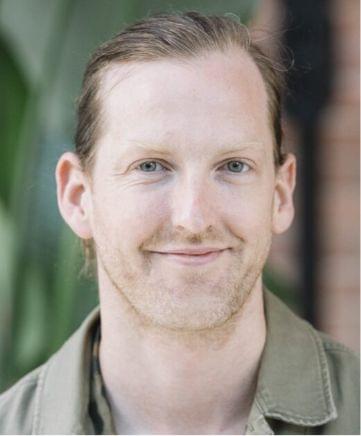
The grandmothers movement will not rest
Founded in 2006, the Grandmothers to Grandmothers Campaign continues to be a critical pillar of the Stephen Lewis Foundation’s work. Grandmothers across Canada, the United Kingdom and Australia determinedly support the work of community-led partners across sub-Saharan Africa. Campaign members are recruiting to grow their membership. They are creating welcoming and fun spaces to connect in meaningful ways, and they are acting on the commitment they made at the first Grandmothers Gathering: We will not rest until they can rest.
One year ago, 200 grandmothers from across Canada gathered in person at the Canadian Museum for Human Rights in Winnipeg and online. At the same time, grandmothers from 10 countries in sub-Saharan Africa held gatherings of their own. They reflected on their work, the Campaign, and the current state of the HIV epidemic.
Long-time supporters of the SLF may recognize an iconic photograph of Stephen Lewis with singer and songwriter Alicia Keys at the inaugural gathering in Toronto in 2006. They are marching with grandmothers to demand rights and recognition of their struggle to raise grandchildren in the wake of the AIDS crisis, which was ravaging their communities. Campaign member Linda Taberner is seen helping to carry the banner in solidarity. She says that her life changed that day.
“It is hard to put into words the wonderful sense of sisterhood which blossomed over those few short days, and that alone would have been enough to keep me involved,” shares Linda. Even after moving to the United Kingdom, Linda says that Stephen’s impassioned support for the grandmothers bearing the impact of the AIDS pandemic, the SLF’s unique and empowering funding approach, and the friendships she made kept her connected and committed. Since its bold beginnings, the Campaign has settled into a dynamic cadence. Grandmothers and grandothers raise about 20% of the SLF’s annual revenue. Grandmothers groups lead fabric sales, host concerts, participate in holiday markets, and hold high tea brunches to raise funds. They cycle and walk thousands of kilometres each year, building a strong sense of community along the way.
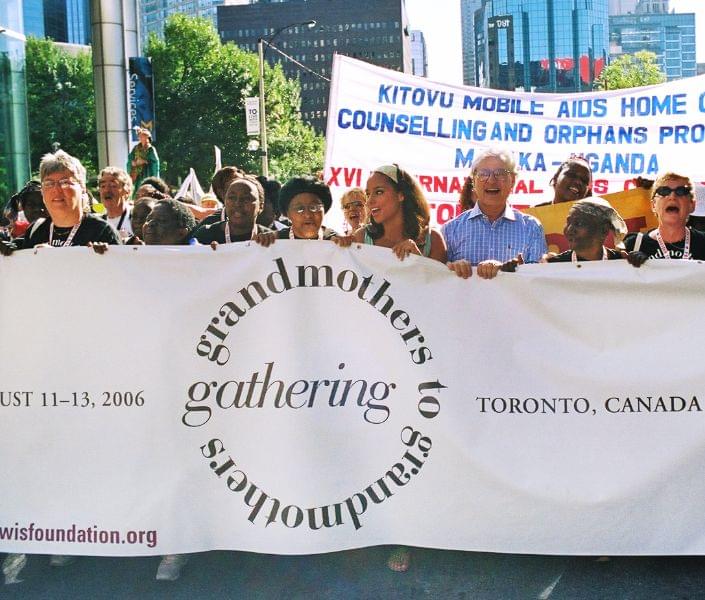
Photo Credit: Victoria Grandmothers for Africa
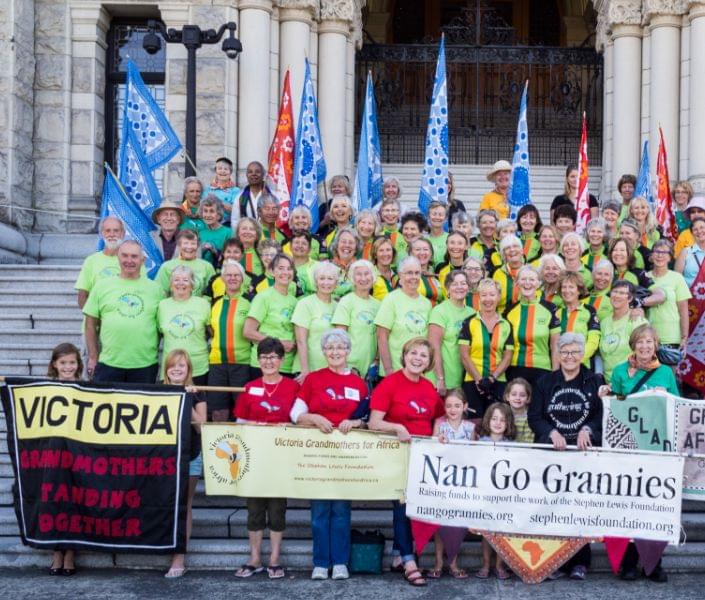
Photo Credit: Victoria Grandmothers for Africa
Grandmothers point to the sense of meaning and purpose that the Campaign brings. Groups large and small are support systems for women and their allies, mirroring peer support groups at SLF partner organizations.
“Being involved in the Campaign has given me a new social circle of remarkable women,” says Nola Ayers, a member of a grandmothers group in Moose Jaw, and regional representative for Saskatchewan. “After retiring in 2010 and losing my husband in 2011, the Campaign has filled many days in many ways. I feel a sense of purpose and enjoy contributing to projects that improve the life of fellow grandmothers and their grandchildren.”
Robin Scobie joined her local Vancouver-area group after she retired in 2016, despite not knowing any other members. “Grandmothers groups come in all shapes and sizes, and everyone’s effort makes a difference,” she says. “There’s no judgement over what you bring to the group — everyone is welcome.”
“I felt at home from that first meeting — it was like I had found my people,” she adds. “The room was full of creative, interesting people who were dedicated to the movement.”
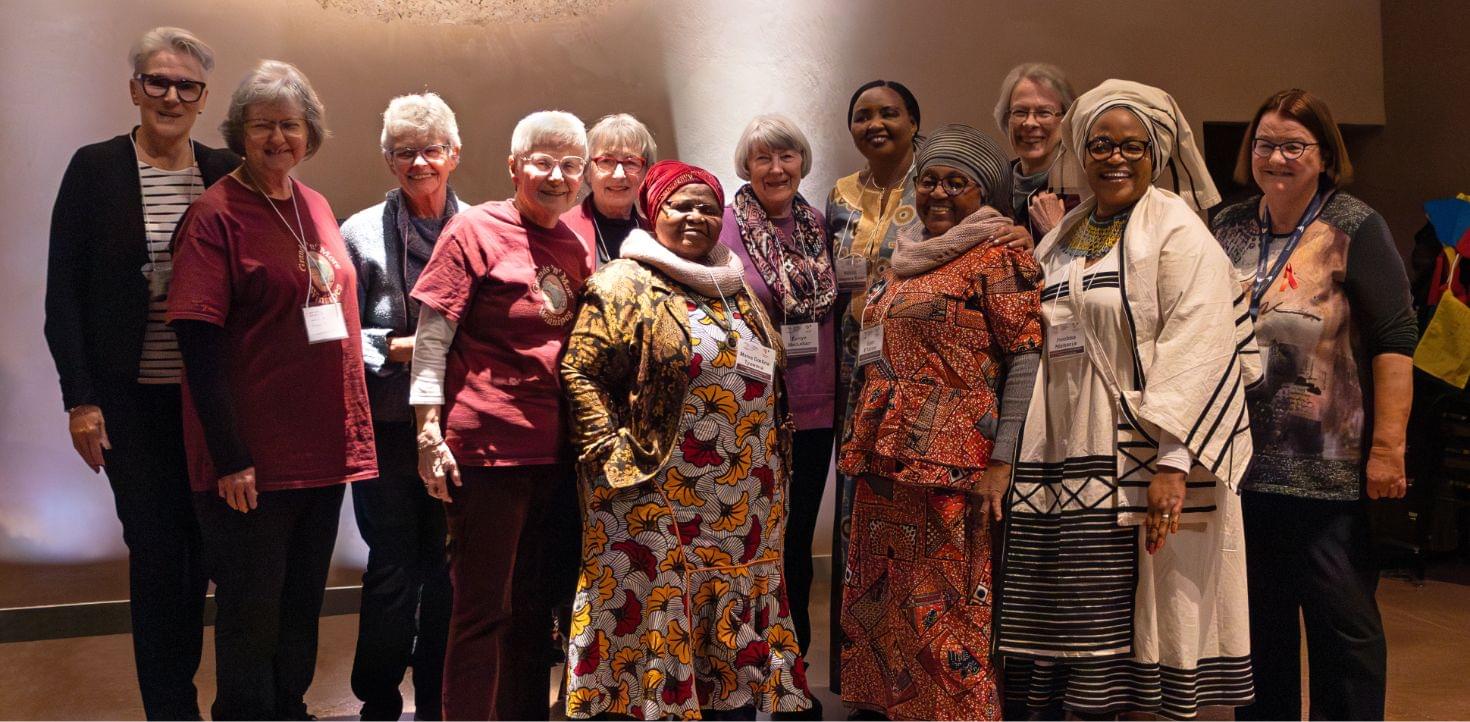
Photo Credit: Riley Martin Media
While the Campaign has evolved over the years, at its core it continues to exist as a grassroots movement committed to community, advocacy and sisterhood. At the International Grandmothers Gathering in Winnipeg, grandmothers discussed how they could carry on and grow the Campaign’s important impact. What emerged was a sentiment that has spurred this movement on, a sentiment that Linda gives credit for her unwavering dedication:
“I’ve always remembered that original promise we made in 2006: We will not rest until they can rest.”
Join the movement!
A group of like-minded women in your area are waiting for you to join them! Learn how you can get involved by emailing campaign@stephenlewisfoundation.org or visiting grandmotherscampaign.org.
The heart and humanity that drives community-led work
Friends of AIDS Support Trust (FAST) has been working in the Nsanje district of Malawi for nearly 30 years. The scope of their work is ever evolving, but the heart of it never changes. They build meaningful, long-term relationships within their community to accompany people through their challenges and triumphs.
FAST is a support system for grandmothers who are primary caregivers for their families. This role significantly affects their economic stability, health and social connections. Caring for caregivers involves practical support like nutritional supplements, food parcels, medical check-ups and anti-retroviral treatment for family members living with HIV.
Equal focus of FAST’s programs is on emotional and social well-being. Staff and volunteers visit grandmothers in their homes and encourage them to stay connected with friends and engage in peer support groups. Women’s savings and loans groups offer a safety net and a springboard for income-generating ventures as well as an opportunity to gather. Outreach campaigns have shifted community perspectives on traditional gender roles and created awareness about older women’s rights.
A dedicated network of volunteers supports FAST’s work and outreach. Winnie Kukhala has been volunteering with the organization since 1997. “[In the beginning] a lot of people were dying and leaving behind many orphans, so we came together for those needing support. We started helping with the orphans, and also those who were dying and bedridden.” Now a grandmother herself, Winnie cares for her five grandchildren while continuing to connect with others. She has become like family among grandmothers in her community, and some refer to her as “Little Sister Kukhala.”
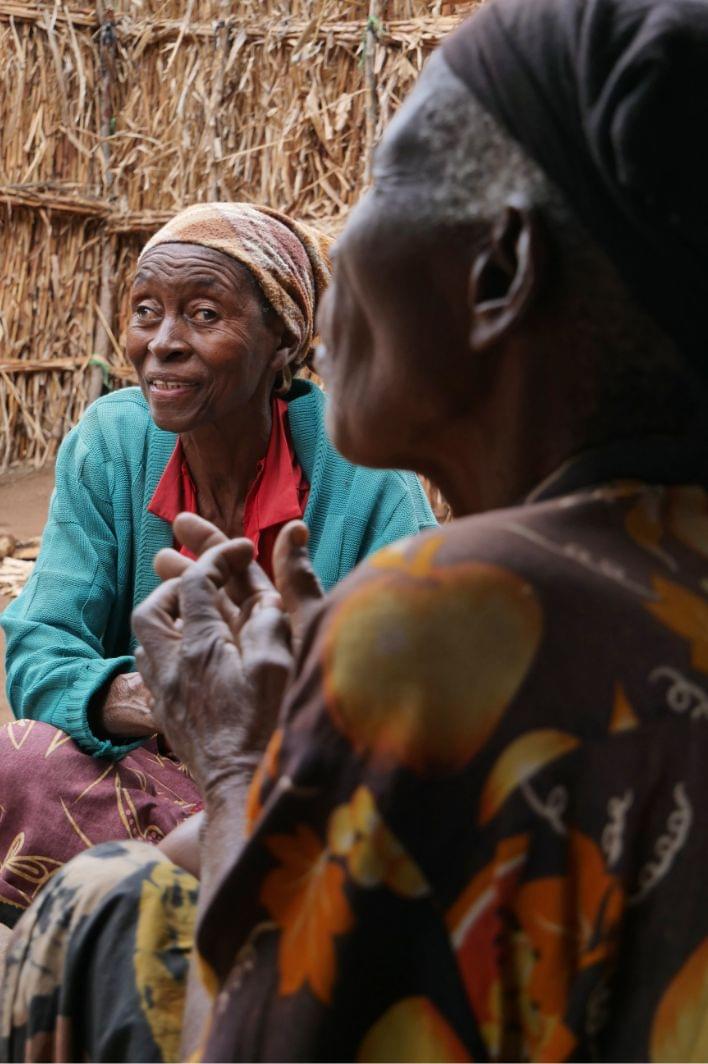
Photo Credit: Eva Gilliam
Organization: FAST
Location: Malawi
FAST is candid about the challenges their community is facing. Global funding for HIV and community-led organizations continues to diminish, and the frequency of climate disasters make operating and living conditions precarious. In recent years, cyclones Freddy, Ana and Gombe have washed away livelihoods and displaced families. Droughts have decimated crops, exacerbating food and income insecurity.
In response, FAST provides disaster preparedness training, emergency supplies and materials to repair homes, and they have formed village committees that prioritize grandmothers’ safety during disasters. They work with Nsanje District Health Office to track displaced clients living with HIV, ensuring they can adhere to their treatment.
Like all SLF partners, FAST innovates and expands services to offer connection and stability when families need it most.
Speaking to the essence of our partners’ work, the SLF’s Deputy Director of Impact and Learning, Leah Odle-Benson says, “Complex issues like HIV and AIDS, poverty, gender-based violence, homelessness and unemployment are not only unjust, but profoundly isolating, and disconnect people from the core of themselves and from others. Our partners offer a connective thread back into a community, reminding people of their humanity and providing a place where they can be seen, heard and understood beyond the external conditions that have come to define their personal lives.”
It’s time to order your holiday tribute cards!
The holiday season is fast approaching, and with it comes a welcome opportunity to reconnect and reflect on global solidarity. This year, consider making donations and sending beautiful printed cards or e-cards to your family, friends and colleagues. Simply donate online and send e-cards for easy and immediate delivery. We can also send you cards to personalize and deliver yourself or mail cards on your behalf. Your contributions will have a meaningful and tangible impact for our grassroots partners and their communities.
